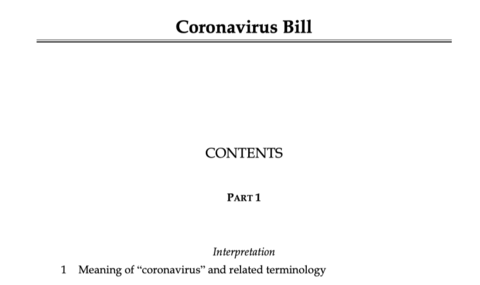In addition to the announcement by Boris Johnson last night sending the UK effectively into lockdown, the Bill for the coronavirus emergency has been published.
The Coronavirus Bill now includes provisions relating to protection from eviction for both residential and commercial tenants.
It was previously announced that new possession claims could not be started for a three month period but the Bill is quite different to that announcement.
Instead of new court claims being prevented, changes are made to the notices landlords serve on their tenants.
Section 81 and Schedule 29 of the Bill contains the provisions for residential tenancies.
The changes will start from the date the Act is passed and will end on 30 September 2020. There is provision to change the end date.
In essence, the section 8 notice, section 21 notice and a notice to quit for a Rent Act 1977 tenancy will have the length of notice increased from its usual length to three months.
A section 8 notice is most commonly used for two months or more arrears and is a fourteen day notice normally (plus four days for service). This will be increased to three months from when the Act is passed until 30 September 2020.
A section 21 notice is normally at least two months and will also increase to at least three months.
Provision is also made to make changes to the prescribed forms that are used (Form 3 for a section 8 notice and Form 6A for a section 21 notice in England only).
We will act as quickly as possible to update our wizard and notices but given the Act will be passed very soon and takes effect immediately, a little patience may be needed whilst we make the changes.
There is also a provision to increase the three month period up to a maximum of six months notice being required.
Existing notices already served are unaffected and possession claims can therefore be commenced after expiry of existing notices served before the Act commences.
Furthermore, after expiry of the three months given, claims can be commenced through the courts.
It’s unclear what the position would be if a three month notice were given and then the period were increased (for example to six months). It would seem that the three month notice would remain valid and a claim could be made. The Act only appears to apply on the day of service of the notice and what the length should be at that time.
It should be noted that even though it may still be possible to commence a possession claim after the Act is passed, in reality, the courts will be struggling to cope generally. Hearings are only allowed if they can be done remotely and it’s likely any hearings could be postponed.
That being said, there appears to be no change as yet to the rule in respect of a section 8 claim for rent arrears that the hearing must be held not less than four weeks but not greater than eight weeks. We will have to wait and see on that one.
In respect of commercial property, the Bill protects business tenancies from being forfeited during the relevant period which is slightly different to residential and is from when the Act is passed until 30 June 2020.
During the relevant period, no conduct by or on behalf of a landlord, other than giving an express waiver in writing, is to be regarded as waiving a right of reentry or forfeiture, under a relevant business tenancy, for non-payment of rent.





Does this apply to all tenancies or just those not able to pay their rent as a direct result of Covid-19? What about those tenants who now purposely choose not to pay their rent ie UC claimants?
It will apply to all the mentioned notices served from the commencement of the Act irrespective of circumstances.